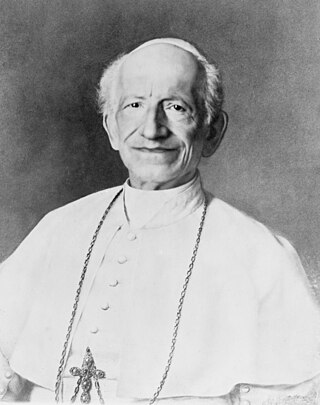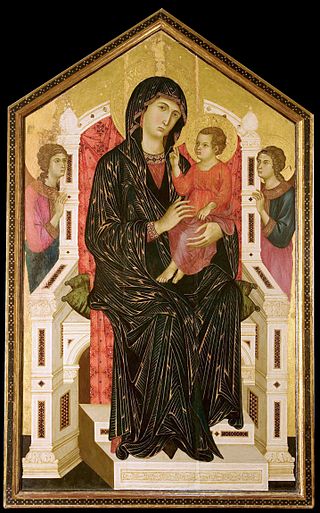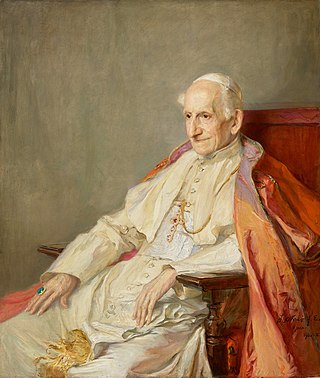Unitatis redintegratio is the Second Vatican Council's decree on ecumenism. It was passed by a vote of 2,137 to 11 of the bishops assembled at the Council, and was promulgated by Pope Paul VI on 21 November 1964.
Dignitatis humanae is the Second Vatican Council's Declaration on Religious Freedom. In the context of the council's stated intention "to develop the doctrine of recent popes on the inviolable rights of the human person and the constitutional order of society", Dignitatis humanae spells out the church's support for the protection of religious liberty. It set the ground rules by which the church would relate to secular states.

Pope Leo XIII was head of the Catholic Church from 20 February 1878 until his death in July 1903. Living until the age of 93, he was the oldest pope whose age can be validated, and had the fourth-longest reign of any pope, behind those of Peter the Apostle, Pius IX and John Paul II.
An encyclical was originally a circular letter sent to all the churches of a particular area in the ancient Roman Church. At that time, the word could be used for a letter sent out by any bishop. The word comes from the Late Latin encyclios. The term is now primarily associated with papal encyclicals.

Council of Constantinople can refer to the following church councils convened in Constantinople :
In Christianity, inculturation is the adaptation of Christian teachings and practices to cultures. This is a term that is generally used by Catholics and the Orthodox, whereas Protestants, especially associated with the World Council of Churches, prefer to use the term "contextual theology".

Humanum genus is a papal encyclical promulgated on 20 April 1884 by Pope Leo XIII.
Satis cognitum is an encyclical of Pope Leo XIII dated 29 June 1896 on the unity of the Church, and some heresies of his time.

Anthimus VII or Anthimos VII served as the Ecumenical Patriarch of Constantinople from 1895 until his resignation on 29 January 1897. He died in Halki, Turkey.
In Suprema Petri Apostoli Sede, also titled Litterae ad Orientales, i.e. Epistle to the Easterners, is a document – either considered as an apostolic letter or as an encyclical letter – sent by Pope Pius IX in 1848 to the bishops and clergy of the Eastern Orthodox Churches urging them to enter in communion with the Roman Catholic Church.
Officio sanctissimo, subtitled "On The Church in Bavaria", was a papal encyclical published by Pope Leo XIII in 1887. It recalled the continuous history of Catholicism in Bavaria; and praised the people's resistance to the Kulturkampf. It also condemned Freemasonry, calling it a "sect of darkness."
Inimica vis is a papal encyclical addressed to the Catholic bishops of Italy. It remarked on the multiple condemnations of Freemasonry over the preceding century and a half and concentrated on the local difficulties of the Italian church. It was promulgated by Leo XIII in 1892.
There are many papal pronouncements against Freemasonry; the most prominent include:

The Mariology of the popes is the theological study of the influence that the popes have had on the development, formulation and transformation of the Roman Catholic Church's doctrines and devotions relating to the Blessed Virgin Mary.

Mariological papal documents have been a major force that has shaped Roman Catholic Mariology over the centuries. Mariology is developed by theologians on the basis not only of Scripture and Tradition but also of the sensus fidei of the faithful as a whole, "from the bishops to the last of the faithful", and papal documents have recorded those developments, defining Marian dogmas, spreading doctrines and encouraging devotions within the Catholic Church.
Social teachings of the papacy encompass papal views described in social encyclicals and other papal communications, beginning with Rerum novarum, Pope Leo XIII's encyclical of 1891.

The theology of Pope Leo XIII was influenced by the ecclesial teachings of the First Vatican Council (1869-1870), which had ended only eight years before his election in 1878. Leo issued some 46 apostolic letters and encyclicals dealing with central issues in the areas of marriage and family and state and society.
Quartus supra ([Twenty-]four) is an encyclical of Pope Pius IX, dated 6 January 1873, addressed to the Armenian Catholic Church. The encyclical discusses the then-ongoing schism within the Patriarchate of Cilicia, the election of bishops, and supremacy of the Holy See.







